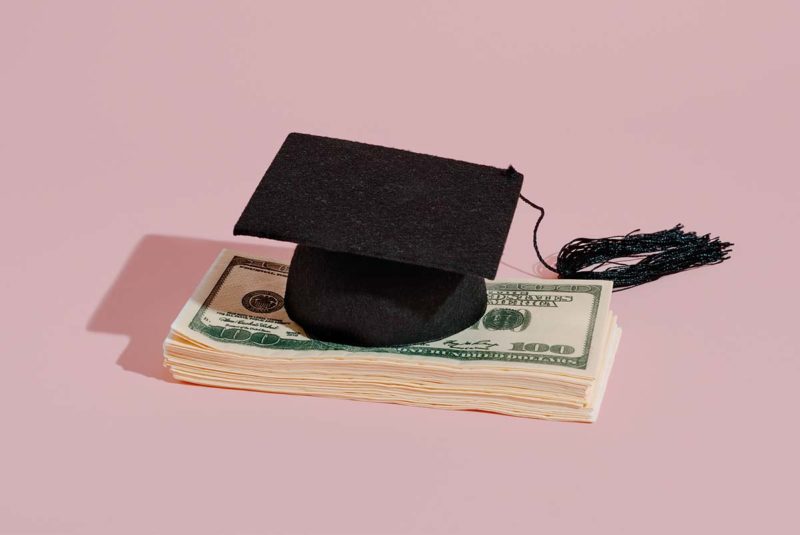You’ve taken the classes, and you’ve imbibed your body weight in ⭐ caffeine ⭐ while enduring sleepless nights of studying. Now that you’ve graduated, you need to figure out how to pay off your looming student loans.
Before you panic-apply to every job on Indeed, just know that you do get a bit of leeway.
The grace period on your student loan buys you a little bit of time.
What Is a Grace Period?
It’s that sweet spot when you aren’t expected to start making payments on your loan. You can certainly start making payments (if you got it like that), but you won’t get hit with late fees or other penalties if you don’t. You’ve already received the loan or line of credit by the time the grace period has started.
For student loans, a grace period can help you settle into post-college life before you’re expected to tackle loan repayment. If you have a loan that accrues interest, this period can help you get ahead with interest-only payments.
Grace period vs. forgiveness
Grace periods don’t last forever. You still have to pay back the loan. But with loan forgiveness, you aren’t expected to pay back some or all of the loan.
Student loan forgiveness is also known as cancellation or discharge, but these two terms mean two very different things.
If you no longer have to pay your loans because of your job (like if you’re a teacher or work in public service), that means your loans have been forgiven or canceled.
If you can no longer pay your loans due to other circumstances (like the school you attended closing), then your loans have been discharged.
How Do Student Loan Grace Periods Work?
Student loan grace periods vary in length depending on the type of loan. For most federal loans, once you graduate, leave school or drop below full-time enrollment your grace period will start.
Grace periods are intended to give you some time to settle into your new life. For a new graduate, this hopefully gives you some breathing room to get a job, relocate to a new area and start to pad a savings account. This can help set you up for success when paying back your loans.
How long is the grace period for student loans?
For most federal loans, you get a 6-month grace period. A Perkins loan, which is a federal loan, can give you up to a 9-month grace period, but this can look different at different schools.
Generally, grace periods for federal loans look like this[1]:
- Direct Unsubsidized and Direct Subsidized Federal Loans: These loans traditionally offer a 6-month grace period.
- PLUS Loans: There are no grace periods for undergraduate students, but you get an automatic 6-month deferment period if you received the loan for graduate school. Parents who take out a PLUS loan can request a 6-month deferment.
- Perkins: A Perkins loan deferment can last up to 9 months, but the grace period’s length depends on the school that gave you the loan.
When does a student loan grace period start?
If your loan has a grace period, it will begin at the time of billing (the first day of the billing cycle).
You will be billed upon graduation, if you leave school or if you drop below full-time enrollment. From this point on, you’re in your grace period.
When does the grace period end for student loans?
The grace period ends after the set amount of months for your loan. For a Direct Unsubsidized or Direct Subsidized loan, the grace period is 6 months.
After 6 months, you will be expected to pay your minimum monthly payment. If you can’t make your payments, you’ll start to get hit with fees.
Check in with your lender or school. Make sure that you fully understand the terms for your grace period. And keep a watchful eye on federal student loans updates on the government’s Financial Student Aid site.
Can I make a student loan payment during my grace period?
Yes! If you have a job (or the cash) and you can make early payments on your student loan, it’s a great idea.
Can I defer my student loans during the grace period?
Grace periods are already a part of the terms for a loan. Deferment requires documentation and an application because there are specific eligibility requirements.
You may be eligible for deferment for the reasons like:
- Cancer treatment
- Economic hardship
- Graduate fellowship
- In-school deferment (If you are a graduate student with a PLUS loan)
- Military service
- Parent PLUS loan deferment
- Rehabilitation services/training (If you are in an ongoing rehabilitation program designed to provide vocational, drug, mental health or alcohol abuse treatment)
- Unemployment
You can apply for the above deferments to extend your grace period.
Grace Period for Subsidized Student Loans
The grace period for subsidized loans is 6 months.
You’re being charged interest while you’re in school, which is subsidized (paid for) by the government. The government also subsidizes interest during the grace period.
This means that you don’t have to worry about paying interest on your loan balance while you’re in school and for 6 months after graduation.
Grace Period for Interest-Only Student Loan Payments
To be clear, there is no such thing as an interest-only student loan payment. You could, however, choose to pay the interest yourself to save some cash down the road.
You should note that if you choose to do this, there is no separate grace period. You’ll still follow the grace period for your loan.
Pay interest only and save in the long-run
Making interest-only payments is a smart move during your grace period or while you’re enrolled in school.
If you have a loan that accrues interest during this time, paying the interest each month will prevent you from having thousands added to your loan balance.
Make these payments when:
- You (or your child under a Parent PLUS loan) are still in school
- You are still in your grace period
- You are under a deferment
The Short Version
- You are not expected to pay your student loan during a grace period
- Most federal loans have a grace period of 6 months
- If you have a loan that accrues interest, it will accrue during the grace period. Make interest-only loan payments to get ahead of the interest on your loan
Federal Student Aid Information Center. “Student Loan Repayment.” Retrieved December 2021 from https://studentaid.gov/manage-loans/repayment




